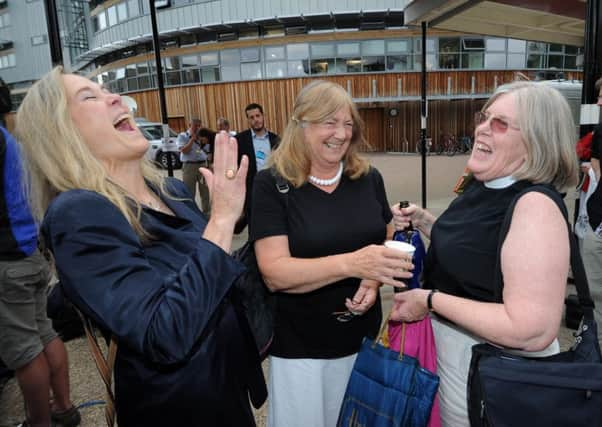‘Positive action’ could be used for first female Anglican bishop


The Anglican General Synod is next month expected to pass church legislation allowing men and women to stand for the post when it meets in London, with the first woman likely to be elected next year, its general secretary William Fittall said.
A leading female cleric in Yorkshire is being tipped as being among the first bishops.
Advertisement
Hide AdAdvertisement
Hide AdMr Fittall said senior clergy have already been asked to identify potential candidates, with the law permitting “positive action” being used in the rare event of a tie between a man and a woman for the top diocesan role.
He said: “If you say ‘Well, we are under-represented’, and manifestly we are - we haven’t got any (women bishops) because we haven’t allowed them up to now - you are, if there is a dead heat able to say ‘Well we will go for the woman rather than the man’.
“I’m sure that those who are doing selections over the coming period will see this as a rather unusual moment where suddenly you have whole group of people who are in the field, in the frame, who have not been before.”
The first diocese vacancy to come up after the canon law is changed will be Southwell and Nottingham. It will be followed by Gloucester, Oxford and Newcastle.
Advertisement
Hide AdAdvertisement
Hide AdSeveral priests whose names have been suggested as the first women bishops include the Very Rev Vivienne Faull, Dean of York Minster, and The Very Rev June Osborne, Dean of Salisbury Cathedral.
Along with gay marriage, the issue of women bishops has dominated religious debate in recent years.
The first women were ordained in 1994 in the Church of England and they now make up about a third of all clergy.
The plan to allow them to stand as bishops was derailed by just six votes cast by lay members in November 2012, causing shock and bitter recriminations within the Church of England and prompting threats of an intervention by Parliament.
Advertisement
Hide AdAdvertisement
Hide AdIt has since been backed by the vast majority of diocese and November’s vote is expected to be a formality.
The measure would see a line added to the start of Canon 33, saying: “A man or woman may be consecrated to the office of bishop.”
Mr Fittall said that bishops had already been invited to identify women priests who might be eligible to stand as a bishop, saying: “When you have half the human race not eligible even for consideration, at the point at which they do become eligible there are manifestly people who might well have been considered in the past, (and) have already done important and senior jobs in the Church of England and it would be surprising if some were not considered suitable for this responsibility.
“So I would be surprised, personally, if we didn’t have the first announcement in 2015.”
Advertisement
Hide AdAdvertisement
Hide AdMartin Dales, lay member for the Diocese of York in the General Synod, said “My view is that the key issue is to get the right person for the right position.
“There is a wide field now but it’s not people’s gender, it’s what they bring to the post they are appointed to that is important.”
* The synod will also hold a debate next month, backed by the former Diocese of Bradford, on the bedroom tax reflecting concerns over the impact of the levy amid claims it is causing considerable hardship. The move could put the Church on collision course with the Conservatives ahead of the General Election.